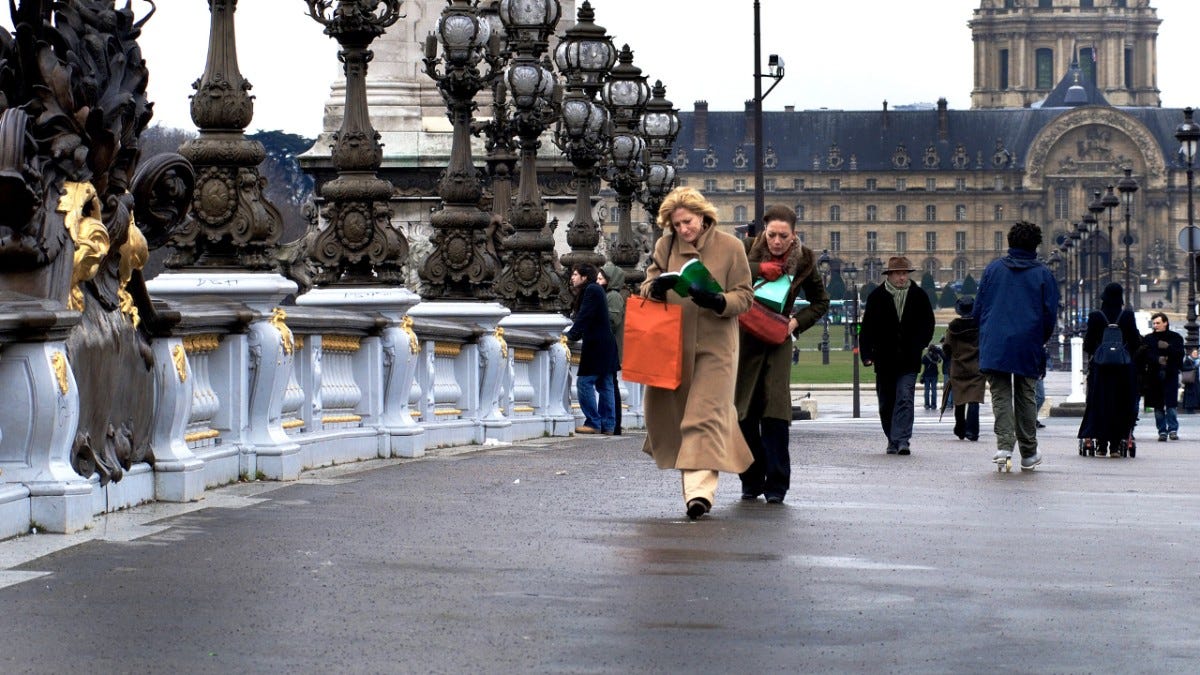
As they eat their first meal in Paris, both Carmela and Rosalie are overjoyed: the latter because she can smoke indoors with abandon, and the former because “nobody fucking knows us here.” Wild-eyed, maybe a little delirious with jetlag, Carm has discovered the secret of traveling to a place you’ve fallen in love with — a place that makes the idea of a different self a little more tangible, that lets you step into one of the parallel lives you might have lived. (Paris is one of those places for me too, so this moment hits extra hard.) It’s an experience that’s both liberating and terrifying: You can be anybody, at least for the period in which you’re outside your normal life, but that means you’ll have to justify your usual self to yourself after you return.
Carmela feels the liberation first, marinating in the aesthetic and philosophical experiences that Paris offers. She marvels at the art everywhere, and admires how even the mundane parts of the city feel more historically significant than anything back home. (I love, as an aside, the way the cab ride into the city inverts Furio’s depressing, strip mall- and gas station-punctuated cab ride home after his trip to Italy, as well as the fact that we get a little callback to “Sentimental Education” with the Abelard and Heloise reference later in the episode — little gestures toward the other alternate-timeline Carmelas we’ve known before.) Historical significance is a fraught notion, one that represents the gap between the truth of who we are and the idealized stories we tell about ourselves. The United States is an architecturally and aesthetically “young” country in large part because we take pains to dispose of everything leading up to the present moment; the formal histories the French prop up in their public spaces stretch back a bit further, but they’re as rife with erasures and elisions as ours.
Under the thrill of consuming beauty and culture, Carmela’s terror gradually takes hold as she also indulges the more spiritually-inclined part of herself — a part she cannot separate out from her regular life. After watching her friend light one prayer candle for her husband and another for her son, Carmela spirals into thinking about mortality until she breaks down crying and admits that she, here and now, understands the moment when Tony briefly awoke from his coma and said, “Who am I? Where am I going?” She’s overwhelmed by how temporary everything is, how flimsy a legacy she’ll leave behind — how historically insignificant her life will prove to be.
It’s not the first time Carmela becomes a vector for this community’s collective spiritual dread. In fact, it’s not even the first time this episode, as before she leaves the States, she traces AJ’s Blockbuster firing and general malaise back to “that whole God is dead business, on the day of his confirmation.” And, in the same way she’s haunted by Tony’s existential question (more haunted than Tony himself is), she keeps returning to her first-episode declaration of what’s going to happen to him when she dies. Even though she often directs her spiritual tendencies into ritualized involvement in their parish community, she’s the only person who consistently worries about what might await them all after all of this, and it’s not surprising that being away from home brings that fear into clearer focus.
Near the end of their time away, Carmela presses Rosalie — who just wants to revel in her own thrilling vacation indulgences, including a hot young Frenchman — for her thoughts on grief and the afterlife. It’s pathological behavior, given that Carm’s family benefited materially from Jackie Sr.’s death and that she must at least suspect her husband was involved in Jackie Jr.’s murder, and Rosalie is right to brush it off as “fuckin’ morbid.” But she goes on to explain that she finds some comfort in imagining all her deceased family members in the afterlife — reunited, happy, at peace. That idea bleeds into Carmela’s subconscious, and later that night, she dreams that she sees Adriana, all dressed up, walking Cosette through a park — a vision that’s interrupted by a security guard saying, “Someone needs to tell your friend she’s dead.”
The closure she finds from this dream can only go so far; Carmela can accept Adriana’s death, but can’t venture into thinking about how it happened, or else she’d never be able to return to her old life. She can’t stay in Paris forever. She slips back into her materialist, conspicuous-consumptive New Jersey life as easily as she slipped out of it. The moments that introduce and conclude her trip perfectly illustrate the inherent shallowness of her everyday life. Before she leaves New Jersey, she tells Tony that he can do “whatever it is boys do when the women are away,” and he later hands her a wad of cash — something he clearly intends as quid pro quo, though it’s not obvious that her understanding is quite so explicit. Before she leaves Paris, she looks up at a sculpted archway — above a Guerlain storefront, a seamless merger of art and consumerism that eases her frictionless return to her normal routine of doing AJ’s laundry while he sulks.

